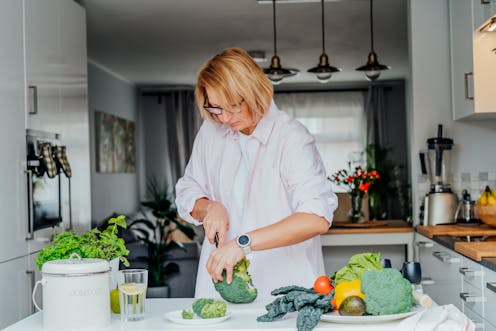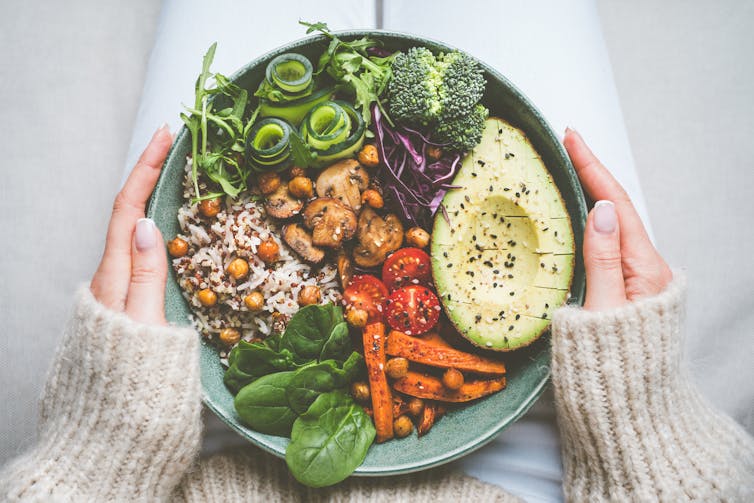
There are plenty of reasons a person might choose to go vegetarian. For example, many people are choosing plant-based diets for environmental and ethical reasons. Another major reason people choose to go vegetarian is because of the hype around its potential health benefits.
Indeed, there’s some evidence that vegetarian diets are linked to lower risk of diabetes, cardiovascular disease and cancer. But there are also growing concerns about poor bone health and higher risk of fracture in vegetarians and vegans.
Previous studies have shown vegetarians have lower bone mineral density. But little research has explored whether vegetarians are at greater risk of certain fractures – especially hip fractures. This is one of the most common types of fracture, and also disproportionately affects women.
Our research sought to address this research gap. We found that women who followed a vegetarian diet were at a 33% higher risk of hip fracture compared with those who regularly ate meat.
Risk of hip fracture
We conducted a large-scale analysis of diet and hip fracture risk using data from the UK Women’s Cohort Study. The cohort consists of 35,000 UK-based women (aged 35-69 years old, the majority of whom were white) who completed a questionnaire about their diet and lifestyle between 1995 and 1998. We linked this data with participants’ hospital records over roughly 20 years to identify who had a hip fracture.
We then grouped the women as regular meat eaters (ate meat more than five times a week), occasional meat eaters (ate meat less than five times a week), pescatarians (ate fish but not meat) or vegetarians (did not eat meat or fish). Vegans were included in the vegetarian group as there weren’t enough vegans to study them separately.
Our analyses also took into account other factors which may influence hip fracture risk – including age, alcohol consumption, smoking, exercise habits, menopausal status and socioeconomic status.
Compared with regular meat eaters, vegetarians had a higher risk of hip fracture. However, there was no increased risk in pescatarians or occasional meat eaters.

Our findings largely agree with results from the only other two studies on this topic. One 2020 study showed that vegetarians (both men and women) were at a 25% greater risk of hip fracture compared with meat eaters. Similarly, in 2021 a US study showed vegetarians were at a 17% greater risk of hip fracture compared with non-vegetarians (though this study was not statistically significant).
Another study actually showed diets with a high intake of fruits and vegetables may decrease risk of hip fractures, but this review didn’t specifically look at vegetarian diets.
Reducing your risk
While there’s an increasing amount of evidence showing vegetarians have poorer bone health (which in turn leads to higher risk of hip fracture), it’s still unclear what’s driving this higher risk.
Further research is needed to identify factors responsible. But in the meantime, here are three evidence-based things you can do to lower your risk of hip fracture:
1. Maintain a healthy weight
Previous studies have shown body mass index (BMI) is lower in vegetarians. While a lower BMI is beneficial for many health conditions, being underweight can also lead to poorer bone and muscle health – both of which can increase hip fracture risk.
Having less body fat means less cushioning during falls, which is a leading cause of hip fractures. Low muscle mass in the hip flexor and spine extensor muscles can also increase risk of falls and hip fracture, potentially by reducing balance and mobility. Low bone mineral density is more likely in people who are underweight, and substantially increases hip fracture risk.
This is why maintaining a healthy weight could be key in preventing fractures in vegetarians. But further research is needed on the interplay between diet, BMI and hip fracture risk to confirm this.
2. Plan your diet
Meat and fish are good sources of several nutrients important for bone health – such as protein, vitamin B12, vitamin D, omega-3 fatty acids, phosphorus and zinc.
While it’s possible to get most of these nutrients from plant sources, eggs and dairy products, previous studies have found lower intakes of these nutrients in vegetarians. In our study, vegetarians had the lowest intakes of protein and vitamin B12, and were less likely to get enough protein in general compared with regular meat eaters.
Vegetarians may therefore need to pay more attention to the amount of these nutrients they get – particularly protein – to maintain healthy bones. Eating plenty of fruits and vegetables, nuts, legumes, beans and wholegrains provides most nutrients needed for bone health. Meat substitutes may provide an alternative protein source.
Eating foods fortified with key nutrients or taking supplements can also help vegetarians get enough vitamin B12 and omega-3 fatty acids, which are difficult to get from plant foods.
3. Lead a generally healthy lifestyle
Several factors alongside diet can help to reduce hip fracture risk, such as avoiding smoking and excessive alcohol consumption, as well as exercising regularly. Resistance exercise (such as weight lifting) may be particularly beneficial as it increases bone and muscle strength.
Of course, vegetarian diets can be good for both you and the planet. But it’s important to know they may increase your risk of hip fractures. More research is needed to find out why, but maintaining a healthy weight, eating a balanced diet and keeping active can all help reduce this risk.
Janet Cade has received funding from research councils and charities for research. She is a director of Dietary Assessment Ltd.
James Webster does not work for, consult, own shares in or receive funding from any company or organization that would benefit from this article, and has disclosed no relevant affiliations beyond their academic appointment.
This article was originally published on The Conversation. Read the original article.







